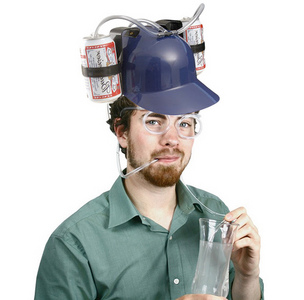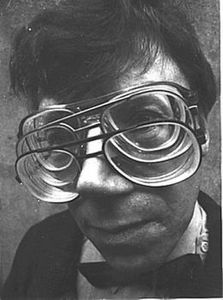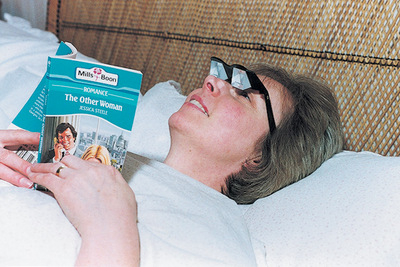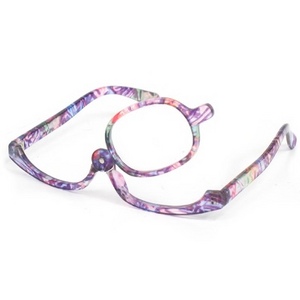Search
Recent
- Glasses Get High-Tech Part 3
- Glasses Get High-Tech Part 2
- Glasses Get High-Tech Part 1
- No optician required!
- Cheap Reading Glasses Bad For Eyesight
Popular
- No optician required!
- Glasses Consigned to History??
- Trends for 2010 and into 2011
- Which glasses suit my face shape?
Category
Archive
No optician required!
Category: Latest News
British inventor Josh Silver, a former professor of physics at Oxford University, has come up with a game-changer of a product design with his water-lensed glasses.
Silver has devised a pair of glasses which rely on the principle that the fatter a lens the more powerful it becomes. Inside the device's tough plastic lenses are two clear circular sacs filled with fluid, each of which is connected to a small syringe attached to either arm of the spectacles.
The wearer adjusts a dial on the syringe to add or reduce amount of fluid in the membrane, thus changing the power of the lens. When the wearer is happy with the strength of each lens the membrane is sealed by twisting a small screw, and the syringes removed. The principle is so simple, the team has discovered, that with very little guidance people are perfectly capable of creating glasses to their own prescription.
You can mass-produce millions of these, rather than manufacturing myriad individual lenses each tuned to a user's specific vision deficiencies. And while the one-size-fits-all mentality may not fly in developed nations, Silver's goal is to help the hundreds of millions of people in developing countries who suffer from poor eyesight.
Silver calls his flash of insight a "tremendous glimpse of the obvious"--namely that opticians weren't necessary to provide glasses. This is a crucial factor in the developing world where trained specialists are desperately in demand: in Britain there is one optometrist for every 4,500 people, in sub-Saharan Africa the ratio is 1:1,000,000.
The implications of bringing glasses within the reach of poor communities are enormous, says the scientist. Literacy rates improve hugely, fishermen are able to mend their nets, women to weave clothing. During an early field trial, funded by the British government, in Ghana, Silver met a man called Henry Adjei-Mensah, whose sight had deteriorated with age, as all human sight does, and who had been forced to retire as a tailor because he could no longer see to thread the needle of his sewing machine. "So he retires. He was about 35. He could have worked for at least another 20 years. We put these specs on him, and he smiled, and threaded his needle, and sped up with this sewing machine. He can work now. He can see."
So far 30,000 of Silver's specs have been distributed, but more are on the way; his eventual target is 100 million pairs.
via the guardian
Cheap Reading Glasses Bad For Eyesight
Category: Latest News
New research suggests that cheap reading glasses might be readily available, but in the long term they can cost you your eyesight.
By the age of 50, most adults have problems reading a book or newspaper without spectacles, so the arrival of the cheap glasses in supermarkets, high street stores and market stalls less than ten years ago has been seen as a saviour for many.
To avoid paying 100's of pounds for a pair of reading glasses from an optician that might easily be lost or broken, many buy several cheap versions to stash around the house so that they can always find a pair.
A researcher at consumer champion 'Which?' checked 14 pairs from seven high street chains and found that those carrying a higher prescription – plus 3.5 to plus 4 – considered to cause the most concern.
"Off-the-peg glasses could cause eye strain, blurred vision, headaches or double vision," The Daily Mail quoted the researcher as saying.
"For people with higher prescriptions, they're not suitable for walking or other mobile activities. They could even 'cause a nasty accident," he added.
The biggest problem is non-alignment, which means that the sight in one eye might be clear while the other is blurred.
"This could cause eye problems or a head tilt," the researcher said.
Opticians say eye examinations are essential before buying glasses. As well as ensuring the correct prescription is used, they can detect serious health issues, such as cataracts and brain tumours.
Glasses Consigned to History??
Category: Latest News
British researchers teamed up with colleagues around the world to pinpoint "variations" in DNA that make people more susceptible to myopia, the most common sight problem.
The breakthrough could lead to treatment in the next decade with eye drops or tablets that halt the distorted growth of the eyeball which causes the condition.
Shortsightedness is a relatively new but growing phenomena and as urbanisation and intensive education levels increase it is reaching epidemic proportions in some parts of the world.
Around a third of people in Britain are short-sighted, but in the Far East it is an even bigger problem, possibly because use of technology at an early age is more prevalent there. In Japan, two thirds of teenagers are already myopic and in Singapore, 80 per cent of 18-year-old male army recruits are short sighted, compared with 25 per cent just 30 years ago.
While watching television, reading and staying indoors is obviously having an effect, researchers knew that there was also a strong hereditary or genetic element to whether you succumbed.
In a study involving thousands of people around the world, including 4,300 in Britain, they searched for genes associated with degrees of myopia.
They found a number of variations around the RASGRF1 gene, which is associated with eye growth, seemed to be strongly associated with myopia - either preventing it or protecting against it.
Researchers now hope to be able to identify how exactly they affect the growth of the eye and then develop treatments that produce the perfect mix of genes.
In this way they should be able to prevent the eyeball distorting and therefore maintain 20-20 vision in most of the population.
"It is not quite the end of glasses yet but clearly the hope is that we will be able to block the genetic pathways that causes shortsightedness," said Dr Christopher Hammond at King's College London, an eye surgeon who led the British research.
"It will probably take the form of a tablet or eye drops but it is going to be a challenge and at least 10 years before there is a treatment."
The findings, published in Nature Genetics, will not be relevent to age-related longsightedness as this is to do with the eye muscles ability to focus and not to do with distortion of the eye ball itself. Reading glasses will still be needed for a while.
Are we worried? Not really.....
Blind Soldier 'See's' With His Tongue!
Category: Latest News
 I can barely stand, but I can see!!
I can barely stand, but I can see!!1 of 2 photos (more»)
A soldier blinded in battle has become the first member of the armed forces to test a special pair of prescription glasses which allow him to 'see' using his tongue.
Lance Corporal Craig Lundberg, who was blinded in a grenade attack in Basra, is testing prototype glasses which turn pictures into electrical impulses that are felt on the tongue. The different sensations mean he can distinguish between light and dark and negotiate his way around objects.
According to Craig, “It’s only a prototype, but the potential to change my life is massive. It has enabled me to pick up objects straight away, I can reach out and pick them up when before I would be fumbling around.”
Wow. When I first spotted this I thought this guy was going to be some kind of loon who really believed he could see with his tongue. Bit of a let down if I'm honest. On the bright side, what does this mean for the future of the sex toy?
WTF Of The Day: Bed Glasses
Category: Random!
When it came to glasses frames, here at SeeInStyle.com we thought we’d seen it all. That was until we spotted these “Deluxe Prism Glasses” from www.bordersindependentliving.co.uk. Genius.
Apparently these babies are designed to fit over your regular glasses whilst allowing you to “read a book, watch TV”, or our personal favourite, “simply watch the world go by" whilst lying flat on your back. Classic.
We really have no idea what makes this particular model “Deluxe”. Perhaps it’s the adjustable ear piece, which according to the website, “can be adjusted with a heat gun”. That will be the heat gun that everyone keeps under the bed then, right? Or perhaps it’s the “vinyl case?” Presumably when they wrote "vinyl" they actually meant "solid gold" then. I digress.
Besides facilitating the bone idle, apparently these fashionable glasses are quite useful for people who have to endure MRI scans, have limited neck movement or simply “for those people who must wear a halo......” Honestly, you can’t make it up.
A new low for laziness. It's so absurd, I want to buy a pair. At £39.60 there's gotta be a cheaper place to buy them, but I'm simply too lazy to check.
Our advice, don’t get up, just get someone to buy them for you.
WTF of the day: Cyclops glasses
Category: Random!
On sale from classiceyeglasses (via ebay) we found some eyeglasses for all you mythological Greek one-eyed beasts with vision problems. Bidding starts at $22.95. Hmmm, I see a problem.
So who would possibly want to buy such a thing?? Well, these glasses are for applying makeup. This 60's trend never really caught on so don't hurt yourself too much for forgetting (or not being born yet). The lens is on a hinge, and you can flip it side to side. This way you can apply makeup to one eye more accurately than with no glasses at all.
Haha, classiceyeglasses. Let's be friends.
Feeling blue??
Category: Fashion
The RGB Glasses from designer Luís Porém are hollow and made to be filled with the ink colour of your choice. Want black glasses? Add black ink! Want pink glasses? Add pink ink! Want tortoiseshell glasses? Add brown, orange, and black ink! Want to frighten everyone you pass? Add the blood of your fallen enemies and smile while you gnaw on a raw arm.
Alternatively, check out the unique colour ranges on seeinstyle.com for that daring look with a difference!







